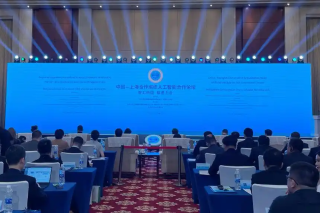Three Pakistanis’ Tianjin story along the BRI

Pakistani students learn Chinese chess and weiqi, known in English as Go, from a Chinese teacher of Tianjin Polytechnic University.[Photo/hqck.net]
Muaz: Tianjin chose me.
"My journey of understanding China began in Tianjin, and this is the city where I got my first impression of China," Muaz Awan, a Pakistani student who is pursuing doctorate degree in civil engineering at Tianjin University, said in fluent Chinese during an interview.
In 2011, Muaz came to Tianjin for one-year-long Chinese preparatory course, and he went to Nanjing to do his undergraduate studies. Although he hasn’t been in Tianjin for long, Muaz has formed an indissoluble bond with the city. "I think Tianjin chose me. When I went to Nanjing, I felt bad to have to leave Tianjin," Muaz described his fate with Tianjin.
After he graduated from Nanjing, Muaz chose to further his study at Tianjin University. He stated that the bilateral relationship has been strengthened over the years with increasing numbers of people exchanges. Up to date, a total of up to 22,000 Pakistani students have studied in China.
"Different Pakistani students including undergraduate, graduate and post-graduate students pursue their study in Tianjin and many people chose to do business in the city. There are also Pakistani doctors working in hospitals here," Muaz said.
He said that Tianjin is a major port city which offers many business opportunities for Pakistanis. Many machinery and equipment are shipped from Tianjin Port to Pakistan for the projects of the China-Pakistan Economic Corridor.
"Historically, Tianjin was China's textile production base. Pakistan has got advantages in cotton. There is great potential for Tianjin to conduct deeper exchanges with Pakistan in the textile industry and facilitate the industry development in Pakistan."
Zemir: China is our example
Muaz's father, Zemir Awan, was among first Pakistanis to study in China after China's reform and opening up. Zemir personally witnessed the great change that transform China from poverty-stricken country to now the world's second largest economy, and he was deeply impressed by the significant changes.
Zemir, who has served as the science and technology counselor of the Pakistani Embassy in China, said that Pakistan's economy developed very rapidly in the 1950s and 1960s, but its later involvement in Afghanistan and suffering from terrorism led to the reducing investment in education and technology, which in turn resulted in the backwardness of Pakistan. He said, "China's peaceful development and reform and opening up serves as a good example for Pakistan."
Muaz agrees with his father that "Pakistan has a lot to learn from China. China's development benefits from domestic political stability and peaceful environment. Pakistan should also prioritize economic development."
When talking about his future, Muaz plans to find a job that enables travels between Pakistan and China. "Like I can’t live without Pakistan, I can't leave China."
Mohamed Yashin: Contributing to the China-Pakistan Economic Corridor
Pakistani Muhammad Yashin is a businessman who travels between the two countries all the year round. His 33-year-long life in Tianjin started from being enrolled in college in 1986. He registered his own company in 1994 and has lived and worked in Tianjin ever since.
Yashin ran an import and export trading company which mainly imports agricultural and sideline products such as fragrant rice, mango and sesame from Pakistan to China, and then exports Chinese vegetables, fruits and some mechanical equipment to Pakistan. The company's annual import and export volume reaches more than $10 million.
According to the data of the Tianjin Branch of the China Council for the Promotion of International Trade, the import and export trade volume between Tianjin and Pakistan in 2017 was about 2.5 billion yuan.
In May of that year, Shabaz Sharif, the Chief Minister of the Punjab Province of Pakistan, led a government delegation to Tianjin to promote investment opportunities in Punjab, hoping to deepen cooperation with Tianjin in vocational education, industrial parks, textile industry and other fields and make joint efforts to contribute towards the construction of the China-Pakistan Economic Corridor.
Muhammad also participated in the promotion. He hopes that more promotion conferences of this kind can be held to facilitate the understanding of businessmen and enterprises from both countries and develop suitable investment projects.
Last month, Yashin made a special trip to the Gwadar Free Zone in Pakistan to discuss the investment and construction of the plant with China Overseas Port Holdings Co., Ltd., which is responsible for the operation of Gwadar Port.
"In the 1980s, the Chinese government issued many policies to promote economic development. At that time, I was impressed and inspired by personal witnessing Tianjin's reform and development. Now Pakistan should learn from China to introduce policies to promote economic development as soon as possible," Yashin said. "Tianjin's business environment is very good, and beneficial for foreign investment. I hope that the big cities in Pakistan will learn from Tianjin and help Pakistan achieve development through the China-Pakistan Economic Corridor."

Copyright ©
Tianjin Municipal Government. All rights reserved. Presented by China Daily.
京ICP备13028878号-35



